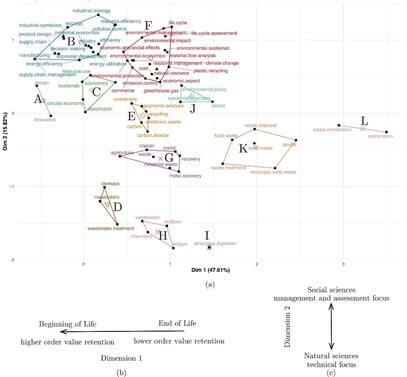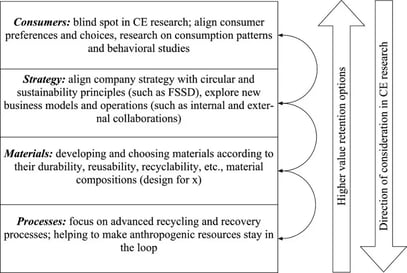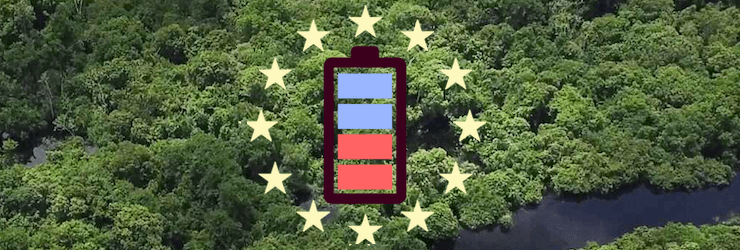Josef-Peter Schöggl, Lukas Stumpf, Rupert J. Baumgartner
Interest in the concept of the Circular Economy has increased significantly in the past few years due to related policies introduced in China and the EU. But how sustainable is the Circular Economy? A recent study by the Christian Doppler Laboratory for Sustainable Product management at University of Graz, Austria, co-funded by iPoint systems, addresses this problem. Learn more in this blog post. The full paper, “The narrative of sustainability and circular economy – A longitudinal review of two decades of research,” was published in Resources, Conservation & Recycling, Vol. 163, 105073 and is available open access: https://doi.org/10.1016/j.resconrec.2020.105073.
Exponential growth and conceptual ambiguity
With the introduction of Circular Economy (CE) policies in major regions of the world economy (namely, in China in 2002, and the EU in 2015), interest in the concept has increased significantly in the past few years. A central question that accompanies this surge in the concept’s popularity is “How sustainable is the Circular Economy?”. Only if the envisioned transition to a Circular Economy can contribute to battling pressing global crises such as climate change, social inequality, or biodiversity loss, it can also be deemed sustainable. While the public debate is dominated by a win-win narrative, a more diverse discourse can be found in the scientific literature. As the field is exponentially growing, especially in the last years, it’s not exactly clear which sustainability aspects are considered Circular Economy research. Therefore, we conducted a study that set out to provide new insights into the state and evolution of Circular Economy research, in general, and its sustainability connotation in particular. This study analyzed all 3,822 peer-reviewed articles that focused on the Circular Economy in the last 20 years with different quantitative and qualitative research methods [1].
Research streams in Circular Economy
The results indicate that, in general, the Circular Economy (CE) body of literature can be divided into management and technically-oriented studies, and these have either a beginning-of-life (BOL) or an end-of-life (EOL) focus. This can be seen in Figure 1, which clusters the top keywords in CE research in a two-dimensional space according to their relatedness. An end-of-life perspective dominates, as a strong prevalence of research focusing on resource efficiency, waste management, and recycling can be observed. For instance, 13 out of 20 main topics identified in CE research, focus on waste and five on recycling. The latter keyword also ranks among the most frequent keywords used in CE research, while other, potentially higher-order CE strategies [2], such as remanufacturing, repair and reuse, are referred to only seldomly.
Overall, the mainstream in CE research can be considered as being relatively narrow and despite its rapid growth in terms of research output, it is only slowly changing in terms of focal diversity. Besides waste, recycling, and efficiency, CE research frequently focuses on industrial ecology/symbiosis, packaging, and Life Cycle Assessment. The latter is the most frequently used sustainability assessment in a CE context, followed by Material Flow Analysis, and a smaller but growing number of specific circularity assessments developed in recent years. Also only in recent years, a BOL-related stream of research emerged. While still comparably small, this stream focuses on product design aspects and adequate embeddedness in a business model. Also, the question of which type of innovation [3] can be applied in practice is being discussed. The emergence of these issues in recent years can be seen positive as it serves to bring CE’s connection to consumption patterns, systems, and business models, more to the fore.

Circular Economy – not an end in itself
From a sustainability perspective, the study also showed that only a limited number of environmental aspects (such as waste, resource use, and CO2 emissions) are addressed in-depth, while other environmental aspects form the periphery of CE research. Social topics remain largely underrepresented or are even neglected. Furthermore, a corporate perspective constitutes the CE mainstream in both the BOL and EOL phase, the consumer’s MOL perspective is addressed vanishingly seldom. While these deficiencies are a clear point of criticism by many scholars, the problem of how the incorporation of social and consumption-based issues may be achieved remains largely unresolved. The transition to the CE needs to involve all societal actors since it is not only a question of raising general levels of acceptance, but also of promoting wide-reaching changes in production and consumption patterns. In this respect, it appears vital to strive for an integration of the process, the material, the strategic, and the consumer perspectives (see Figure 2). Only by combining those perspectives adequately – by taking a full life cycle perspective – can a systemic CE transition, one which is in line with the principles of sustainability, be successfully accomplished.
Read the full paper (open access) here: https://doi.org/10.1016/j.resconrec.2020.105073

Notes:
[1] In the analysis, a mixed-methods approach was adopted that combined a longitudinal bibliometric study (Cobo, López-Herrera, Herrera-Viedma, & Herrera, 2011), a correspondence analysis with k-means clustering (Greenacre, 2007), a correlated topic model (Blei & Lafferty, 2007; Grün & Hornik, 2011), a historiographic citation analysis (Aria & Cuccurullo, 2017; Garfield, 2004) and a semantic content analysis (Mayring, 2015).[2] As, for instance, formalized in the 10-R strategies by Reike, Vermeulen, & Witjes (2018), presented here in decending order from the highest to the lowest order: R0 Refuse, R1 Reduce, R2 Resell/Reuse, R3, Repair, R4 Refurbish, R5 Remanufacture, R6 Repurpose, R7 Recycle, R8 Recover, R9 Remine
[3] e.g., market, network, business model, service, organizational structure, product, process, service, or customer engagement (Prieto-Sandoval, Jaca, & Ormazabal, 2018)
References:
Aria, M., & Cuccurullo, C. (2017). bibliometrix: An R-tool for comprehensive science mapping analysis. Journal of Informetrics, 11(4), 959–975. https://doi.org/10.1016/j.joi.2017.08.007
Blei, D. M., & Lafferty, J. D. (2007). A correlated topic model of Science. The Annals of Applied Statistics, 1(2), 634–634. https://doi.org/10.1214/07-aoas136
Cobo, M. J., López-Herrera, A. G., Herrera-Viedma, E., & Herrera, F. (2011). An approach for detecting, quantifying, and visualizing the evolution of a research field: A practical application to the Fuzzy Sets Theory field. Journal of Informetrics, 5, 146–166. https://doi.org/10.1016/j.joi.2010.10.002
Garfield, E. (2004). Historiographic mapping of knowledge domains literature. Journal of Information Science, 30(2), 119–145. https://doi.org/10.1177/0165551504042802
Greenacre, M. (2007). Correspondence analysis in practice (Second). Boca Raton: Chapman & Hall/CRC, Taylor & Francis Group. https://doi.org/10.1201/9781315369983
Grün, B., & Hornik, K. (2011). topicmodels: An R Package for Fitting Topic Models. Journal of Statistical Software., 40(13), 1–30.
Mayring, P. (2015). Qualitative Inhaltsanalyse: Grundlagen und Techniken. (Beltz, Ed.) (12., über). Weinheim Basel.
Prieto-Sandoval, V., Jaca, C., & Ormazabal, M. (2018). Towards a consensus on the circular economy. Journal of Cleaner Production, 179, 605–615. https://doi.org/10.1016/j.jclepro.2017.12.224
Reike, D., Vermeulen, W. J. V., & Witjes, S. (2018). The circular economy: New or Refurbished as CE 3.0? — Exploring Controversies in the Conceptualization of the Circular Economy through a Focus on History and Resource Value Retention Options. Resources, Conservation and Recycling, 135(5), 246–264. https://doi.org/10.1016/j.resconrec.2017.08.027
Schöggl, J.-P., Stumpf, L., & Baumgartner, R. J. (2020). The narrative of sustainability and circular economy – A longitudinal review of two decades of research. Resources, Conservation and Recycling, 163, 105073. https://doi.org/10.1016/j.resconrec.2020.105073






